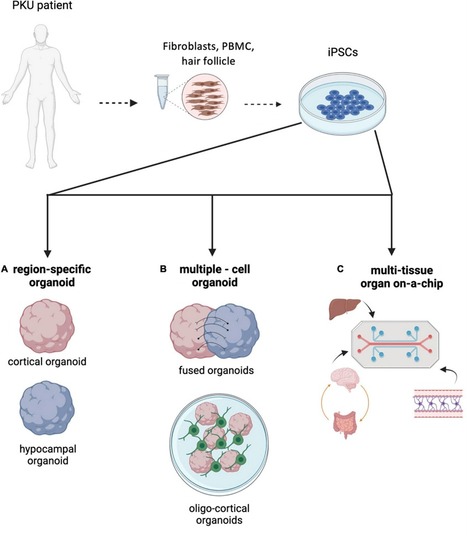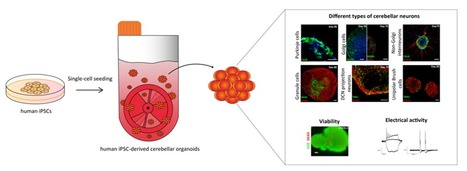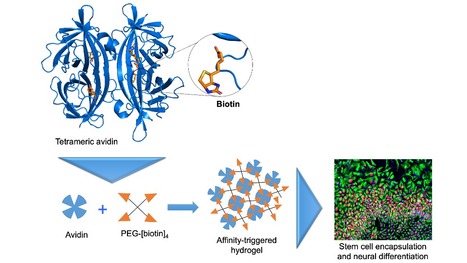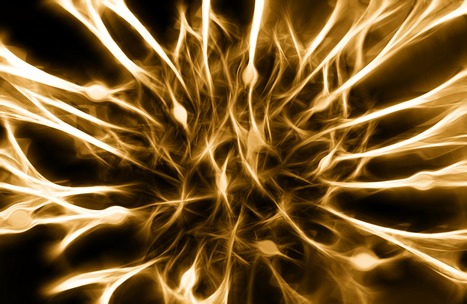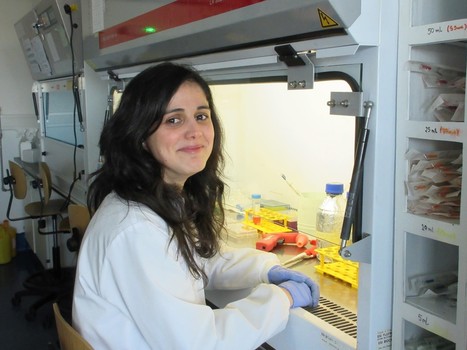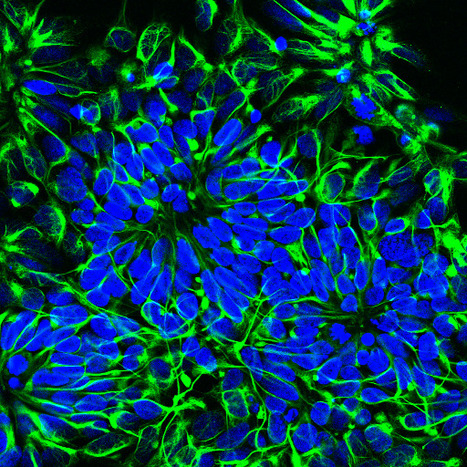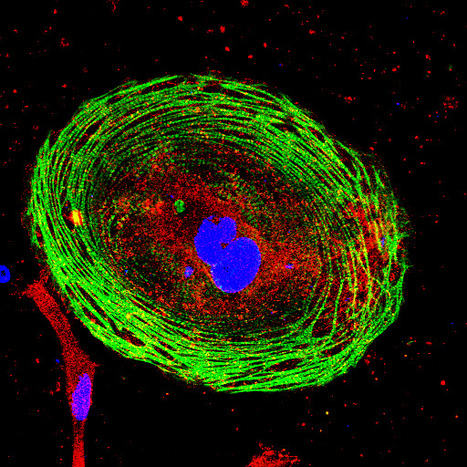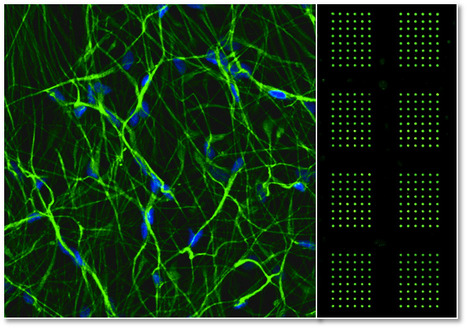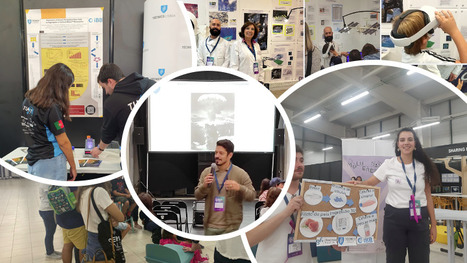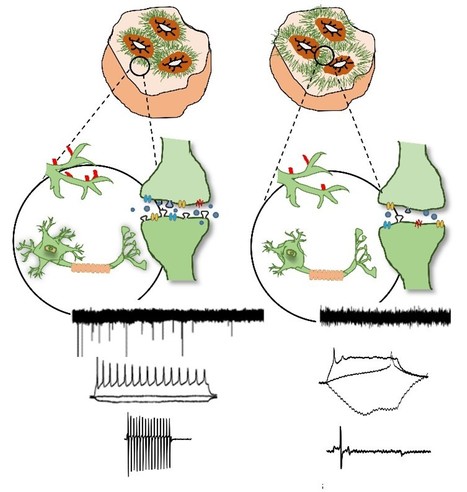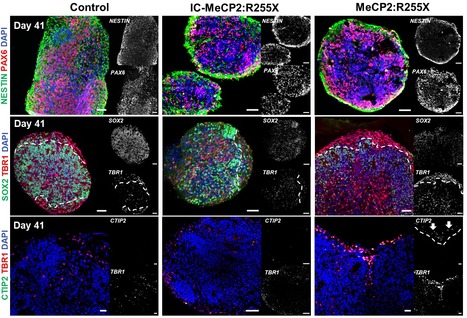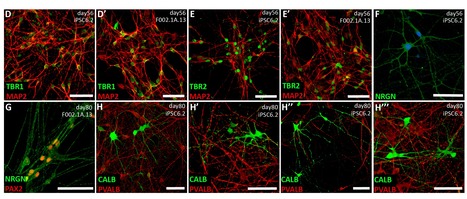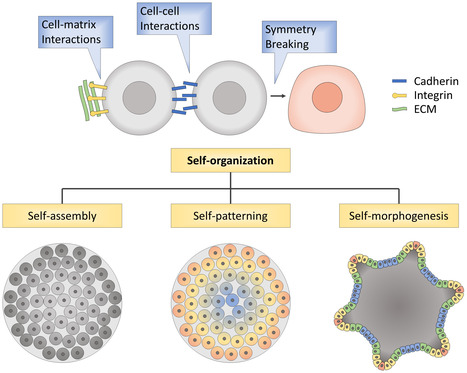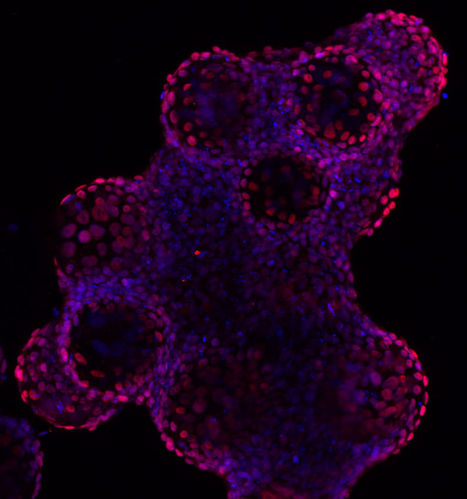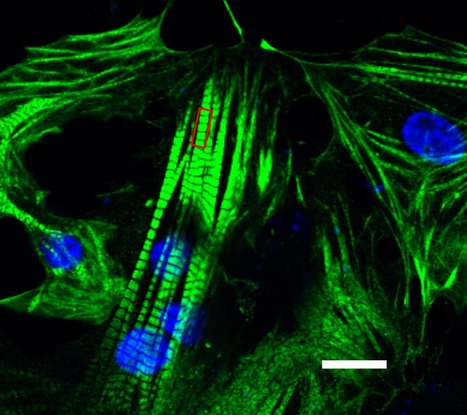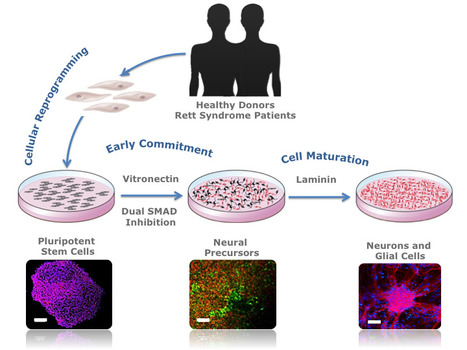 Your new post is loading...
 Your new post is loading...

|
Scooped by
iBB
July 27, 2023 12:20 PM
|
Inspiration and Teaching: The Journey of Tiago Fernandes at Técnico Taguspark
Tiago Fernandes, professor at the Bioengineering department (DBE) at Técnico and researcher at the Institute of Bioengineering and Biosciences (iBB), recently spoke about his life path and his experience at Técnico, more specifically on the Taguspark campus. He characterises Técnico Taguspark as “Welcoming” due to his familiar environment. He considers that people's relationships are closer, and that the peaceful environment helps him concentrate on his work. Check out Tiago Fernandes' interview here: “Técnico Taguspark in a word”.

|
Scooped by
iBB
January 11, 2022 5:29 AM
|
Engineering Organoids for Modeling PKU
Phenylketonuria (PKU) is a recessive genetic disorder of amino-acid metabolism, where impaired phenylalanine hydroxylase function in the liver of patients leads to the accumulation of neurotoxic phenylalanine levels in the brain. Despite the current knowledge, the chronic effect of PKU in the brain is still poorly understood. In a recent publication in Frontiers in Molecular Neurosciences, DBE faculty and SCERG-iBB researcher Tiago Fernandes, discusses the need for better predictive models, able to recapitulate specific mechanisms of this disease. New exciting in vitro platforms to model specific PKU-derived neuronal impairment are presented in a attempt to understand the impact of phenylalanine in the brain of patients, and ultimately contribute to the understanding of this disease.

|
Scooped by
iBB
April 30, 2021 6:00 AM
|
Transcriptomic Profiling of Human Pluripotent Stem Cell-Derived Cerebellar Organoids
Endogenous human brain tissue is not easily available for studying neurodevelopment and neurodegenerative diseases. However, human pluripotent stem cells (PSCs) have been used to generate a variety of glial and neuronal cells of the central nervous system. Still, reproducible protocols for generating in vitro models of the human cerebellum are scarce. In this context, Silva et al. describe the scalable production of human PSC-derived cerebellar organoids using single-use vertical-wheel bioreactors. The transcriptomic profile of cerebellar organoids derived under dynamic conditions demonstrates a faster cerebellar differentiation combined with significant enrichment of extracellular matrix and upregulation of transcripts involved in angiogenesis when compared with the static protocol. The authors anticipate that large-scale production of cerebellar organoids may help developing models for drug screening, toxicological tests and studying pathological pathways involved in cerebellar degeneration.

|
Scooped by
iBB
July 7, 2020 5:49 AM
|
Affinity-based Physical Hydrogels for Stem Cell Encapsulation and Differentiation
Affinity-triggered hydrogels were created using one of the most selective and high-affinity pairs found in Nature, avidin-biotin. The multimerization of biotin was studied by conjugation into different multi-arm polyethylene glycol molecules. Depending on the multimerization, assemblies with tunable affinity constant were obtained leading to hydrogels with different mechanical properties and controllable erosion time and profiles. The results showed that mimicking natural multivalency gave rise to robust biocompatible hydrogel with applications in tissue engineering and stem cell research. The study results from ongoing collaboration between Cecília Roque (FCT-NOVA) and Tiago Fernandes (DBE-Técnico) and was recently published in the ACS journal Biomacromolecules.

|
Scooped by
iBB
October 8, 2019 11:49 AM
|
Special Research Topic on “Stem Cell Systems Bioengineering”
Tiago G. Fernandes from SCERG-iBB is guest-editing a special topic for the open-access journal "Frontiers in Bioengineering and Biotechnology" entitled "Stem Cell Systems Bioengineering". Advances in the bioengineering field have allowed the manipulation of singular aspects of the cellular microenvironment, and this Research Topic aims to focus on outstanding examples of bioengineering approaches used to promote the self-organization of human cells and the production of tissue-like structure formation.

|
Scooped by
iBB
October 24, 2018 11:50 AM
|
Teresa Silva Defends PhD Thesis in Bioengineering (Cell Therapies and Regenerative Medicine)
Teresa Silva will be defending his PhD thesis in Bioengineering (MIT Portugal) at Instituto Superior Técnico, wednesday the 26th October 2018 (15:00 H, room PA3). During the last years, and under the supervision of Carmo Fonseca from IMM and Tiago Fernandes and Evguenia Bekman from SCERG-iBB, Teresa worked on the development of new models to study neurodegenerative diseases such as ataxias that are caused by dysfunction of the cerebellum. The title of her thesis is "Novel bioengineering strategies for modeling cerebellar ataxias”.

|
Scooped by
iBB
May 25, 2018 7:19 AM
|
Neural Induction of Human Induced Pluripotent Stem Cells for Neurodevelopmental Toxicity Studies
The ability to differentiate neural progenitors (NP) from human induced pluripotent stem cells (hiPSCs) provides an opportunity to develop new applications for cellular therapy, disease modelling and drug screening. SCERG-iBB researchers developed a platform that can be applied towards the study of the effect of neurotoxic molecules that impair normal embryonic development, such as the antiepileptic drug valproic acid (VPA). It was verified that exposure to VPA led to a prevalence of NP structures over neuronal differentiation, confirmed by analysis of the expression of neural cell adhesion molecule, and neural rosette number and morphology. This methodology can potentially complement current toxicity tests for the detection of teratogenic compounds that can interfere with normal embryonic development. The work was published in Toxicology Letters.

|
Scooped by
iBB
November 13, 2017 3:16 PM
|
Featured Photo: hiPSC-Derived Cardiomyocytes
Description: Culture of hiPSC-derived cardiomyocytes expressing Cardiac Troponin T (green) and N-Cadherin (red) featured photo by Tiago Dias, Copyright SCERG-iBB 2016.
Context: SCERG researchers led by Joaquim Cabral, Margarida Diogo and Tiago Fernandes are establishing new methodologies for cardiac differentiation of human induced pluripotent stem cells (hiPSC). The work is being performed in the context of iBB’s Strategic Area 1: Stem Cell Engineering.

|
Scooped by
iBB
January 28, 2016 6:11 AM
|
Tiago Fernandes selected for 2016 Regenerative Medicine Workshop Young Investigator Postdoctoral Award
The work entitled, “Factorial Analysis of Signaling Pathways Involved in Pluripotency and Lineage Specification Reveals a Dominant Effect of Wnt Signaling in Mesendoderm Differentiation of Human Pluripotent Stem Cells,” by Tiago Fernandes from BERG-iBB and coworkers has been selected for the inaugural 2016 Regenerative Medicine Workshop Young Investigator Postdoctoral Award, which will take place at the Harbour Town Clubhouse & Conference Center, SC, USA. As the awardee, Tiago Fernandes will be given a featured presentation at the workshop, on Saturday, March 19, 2016 at 10:00 a.m.

|
Scooped by
iBB
July 19, 2014 6:31 PM
|
In collaboration with Rensselaer Polytechnic Institute (RPI/USA), BERG researchers at the Stem Cell Bioengineering and Regenerative Medicine Laboratory (SCBL) have recently developed a 3D microarray platform to perform high-throughput studies of human Neural Stem Cell (hNSC) Differentiation and Toxicology. By using this platform it is possible to screen for the differential toxicity of small molecules to hNSCs which may help to predict, in vitro, which compounds pose an increased threat to neural development and should therefore be prioritized for further screening and evaluation. The work was published in “Stem Cell Research” journal. Click on title to learn more,
|

|
Scooped by
iBB
October 20, 2022 11:30 AM
|
iBB present at FIC.A – Festival Internacional de Ciência 2022
Our researchers were involved in many different ways at this year's edition of FIC.A – Festival internacional de Ciência 2022. Vasco Bonifácio was involved in the activities "The Perfume Laboratory", "The Air We Live In", "Black Ink Secrets", and also assisted the "Virtual Tour To The International Space Station (ISS)" using VR glasses. Tiago Fernandes talked to young audiences about "Challenges and opportunities in Regenerative Medicine and Stem Cells". Our student Diana Marques talked to kids about "The Future of food and 3D printing", an activity developed under the umbrella of the initiative "Soapbox Science Lisbon" that promotes the visibility of women in Science. Finally, we were also represented in the Técnico stand with the hands-on activity "Bioreactors for Cell Expansion".

|
Scooped by
iBB
April 30, 2021 6:28 AM
|
Modeling Rett Syndrome with Human Pluripotent Stem Cells: Mechanistic Outcomes and Future Clinical Perspectives
Rett syndrome (RTT) is a rare neurodevelopmental disorder caused by mutations in the gene encoding for the MeCP2 protein. Among different roles, MeCP2 has a high phenotypic impact during the different stages of brain development. Thus, it is essential to investigate the function of MeCP2 and its regulated targets. In a review paper published in the International Journal of Molecular Sciences, a team of researchers at SCERG-iBB provides a brief summary of the main neurological features of RTT and of the impact of MeCP2 mutations in the neuropathophysiology of the disease. A thorough revision of recent advances and future prospects of RTT modeling using human neural cells derived from pluripotent stem cells and its contribution for the current and future clinical trials for RTT is also provided.

|
Scooped by
iBB
December 30, 2020 6:08 AM
|
Modeling Rett Syndrome With Human Patient-Specific Forebrain Organoids
Engineering brain organoids from human induced pluripotent stem cells (hiPSCs) is a powerful tool for modeling brain development and neurological disorders. Rett syndrome (RTT), a rare neurodevelopmental disorder, can greatly benefit from this technology, since it affects multiple neuronal subtypes in forebrain sub-regions. SCERG-iBB researchers have recently established dorsal and ventral forebrain organoids from control and RTT patient-specific hiPSCs recapitulating the 3D organization and functional network complexity of this brain region. The data obtained revealed a premature development of the deep-cortical layer, associated to the formation of TBR1 and CTIP2 neurons, and a lower expression of neural progenitor/proliferative cells in RTT dorsal organoids. Moreover, calcium imaging and electrophysiology analysis demonstrated functional defects of RTT neurons. Additionally, assembly of RTT dorsal and ventral organoids revealed impairments of interneuron’s migration. Overall, these models provide a better understanding of RTT during early stages of neural development, demonstrating a great potential for personalized diagnosis and drug screening. The paper was published in Frontiers in Cell Development Biology.

|
Scooped by
iBB
June 17, 2020 12:32 PM
|
Maturation of Human Pluripotent Stem Cell-Derived Cerebellar Neurons in the Absence of Co-Culture
In a new paper published in Frontiers in Bioengineering and Biotechnology, SCERG-iBB researchers in collaboration with colleagues from the Institute of Molecular Medicine (iMM) describe a novel differentiation strategy that uses defined medium to generate Purkinje cells, granule cells, interneurons, and deep cerebellar nuclei projection neurons, that self-formed and matured into electrically active cells. This research is expected to result in better models for the study of cerebellar dysfunctions and represent an important advancement towards the development of autologous replacement strategies for treating cerebellar degenerative diseases.

|
Scooped by
iBB
April 23, 2019 10:50 AM
|
Design Principles for Pluripotent Stem Cell-Derived Organoid Engineering
Human morphogenesis is a complex process involving distinct microenvironmental and physical signals that are manipulated in space and time to give rise to complex tissues and organs. The development of organoids represents a novel way to modeling such complexity. Advances in the bioengineering field have allowed the manipulation of different components, including cellular and noncellular factors, to better mimic the natural microenvironment and generate better organoid models of human morphogenesis. In a paper published in Stem Cells International, a team of researchers from the Stem Cell Engineering Research Group (SCERG) at iBB in collaboration with the Institute of Molecular Medicine reviewed the bioengineering strategies used to control the initial state and spatiotemporal positioning of cells within organoids and, lastly, the growth and remodeling of multicellular aggregates to achieve mini organ-like structures.

|
Scooped by
iBB
June 21, 2018 12:30 PM
|
Expansion of Human Induced Pluripotent Stem Cells in Vertical-Wheel Bioreactors
The successful use of Human induced Pluripotent Stem Cells (hiPSC) for disease modelling, drug discovery and, ultimately, for regenerative therapies depends on the development of robust bioprocesses capable of generating large numbers of hiPSC and derivatives. SCERG-iBB researchers developed a bioprocess for the scalable generation of hiPSC in a microcarrier-based system using, for the first time, single-use Vertical-Wheel bioreactors. hiPSC culture was performed in working volumes up to 300 mL, maintaining the pluripotency and genomic integrity of the cells, providing an important tool for the successful manufacturing of hiPSC-based products. The work was published in the Journal of Chemical Technology and Biotechnology.

|
Scooped by
iBB
May 18, 2018 11:36 AM
|
Structural Maturation of Human Cardiomyocytes Derived from Pluripotent Stem Cells
Cardiomyocytes derived from human induced pluripotent stem cells (hiPSC-CMs) have an enormous potential for in vitro modeling of cardiac diseases and for testing the effect and toxicity of new drugs. However, when compared to adult CMs, hiPSC-CMs are very immature, exhibiting low structural development and functionality. SCERG-iBB researchers developed a novel methodological framework to quantify structural aspects of hiPSC-CMs during long-term culture. hiPSC-CMs showed significant progression in several structural characteristics namely cardiomyocyte fiber density and length. Importantly, this methodology contributes to set new metrics to develop applications for drug screening and disease modeling for hiPSC-CMs. The research has been published on Biochemical and Biophysical Research Communications.

|
Scooped by
iBB
April 9, 2017 5:40 PM
|
Stem Cell Biosystems Engineering
Tiago Fernandes, will be giving a talk entitled “Stem Cell Biosystems Engineering”, Monday the 10th April, at 12h30m, in room QA1.3, South Tower, IST (Alameda). The seminar will highlight progress made on integrated platforms that brings together engineering and biology in order to accelerate progress towards designing the stem cell fate and its microenvironment. Tiago Fernandes is currently an Assistant Professor ate DBE, IST and a Research Associate at SCERG-iBB. His research has focused on the development of predictive models of signaling networks from raw data, study the dynamic regulation of pluripotency circuit components, and gain new insights into the regulatory mechanisms underlying multilineage cell specification, ultimately enabling novel tools for Regenerative and Precision Medicine, including stem cell-based therapies, and thus positively impacting health and welfare. The talk is included in the 2nd Edition of iBB seminars.

|
Scooped by
iBB
July 6, 2015 6:14 AM
|
In a recent publication in Biotechnology Journal researchers from the Stem Cell Bioengineering and Regenerative Medicine Laboratory (SCBL) at BERG-iBB describe a novel methodology capable of providing patient-specific neural cells under defined conditions using vitronectin and dual SMAD inhibition. The authors show how pluripotent stem cells can be used to generate patient-specific neural cells that could be used to gain a better understanding of disease mechanisms. This ability to recapitulate the development of the human nervous system in vitro could provide important insights on the mechanisms involved in the maturation of specific neural cell types, making this approach transversal to other related areas in neurodevelopmental research.
|
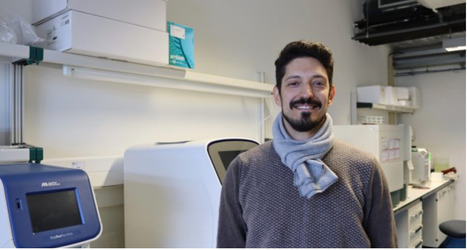



 Your new post is loading...
Your new post is loading...


